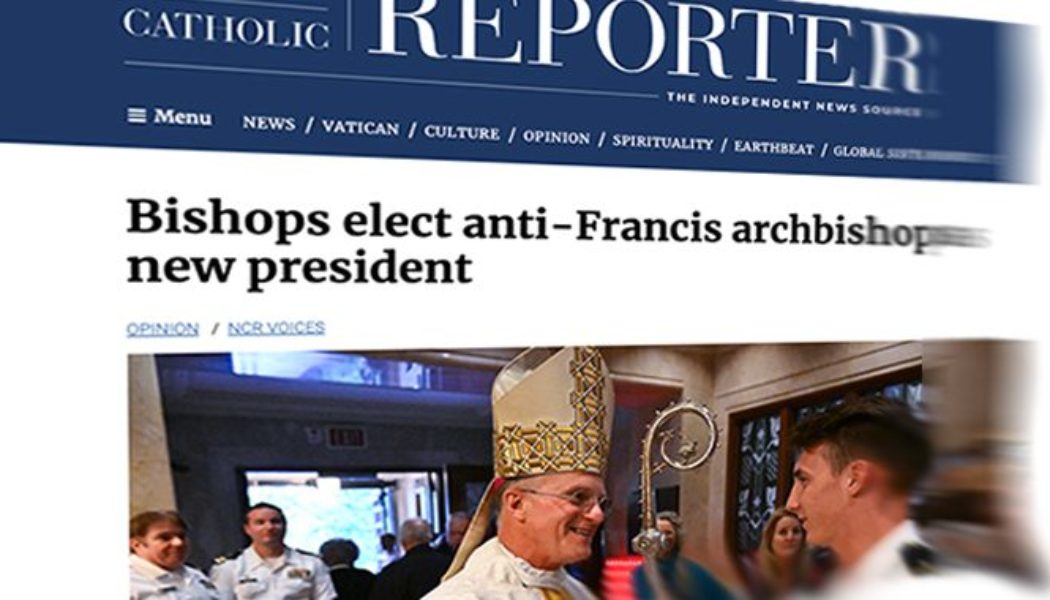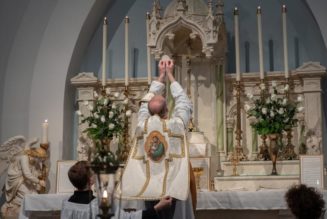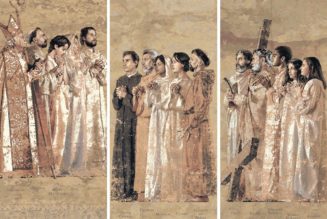
The folks over at the National Catholic Reporter must think we have poor memories or no memory at all.
For decades, the Reporter positioned itself as the loyal opposition to what it viewed as an overly authoritarian papacy thwarting the “true reform” of the Church. Operating from within a populist, liberal modality, they adopted the rhetoric of the various grassroots political movements of the Sixties in order to agitate for broad and sweeping changes in Church doctrine, morality, and practice.
The new democratic ethos of modernity and the secular liberal trends of contemporary culture all pointed toward a “curve of history” that the Church needed to get in line with or perish. The “people of God” metaphor was put in the service of this populist message with strong claims being made that the cultural sea change that was going on among Catholics in the West represented a paradigm shift that was the fruit of the Holy Spirit pushing the hierarchy “from below” to change with the times.
The Reporter was not the fringe publication of a handful of disgruntled bohemian Catholics cranking out their little underground newspaper in some stoner’s basement. When I was a young man, the Reporter was the go-to source for dissident Catholics and that gave them ecclesial clout in the American Church and a certain street credibility. The publication was standard fare in thousands of parish reading racks, as well as in every seminary and Catholic university library. Thus, its anti-papal message was not something subtle or hidden. It was the dissident Catholics’ stock-in-trade, their calling card, and anybody who was involved in Church work was well aware of the latest missives from these liberal lions in Kansas City.
This popularity allowed the Reporter to pay little heed to their conservative Catholic critics, among them not a few bishops, who admonished the Reporter for its disobedience to the magisterium and its insolent disregard for papal teaching in particular. Such criticisms were summarily dismissed as the last gaspings of fearful reactionaries who were upset over the loss of their grip on power. The clock was ticking and time was running out on the old Church of papal authoritarianism. And every papal or episcopal move against the more liberal wing of the Church was vociferously denounced by the Reporter as a horrific denial of the rights of conscience and a display of raw autocratic power that was almost Stalinist in its lusting after total control over the lives of believers.
The Reporter excoriated Humanae Vitae loudly and often and its pages were festooned with dissenting opinion pieces promoting proportionalist moral theologians Charles Curran and Richard McCormick, among others. Indeed, after 1968, barely a week would go by without the Reporter finding ever new ways to denounce the teaching on contraception as a horrific hardship for ordinary Catholics that bordered on ecclesial spiritual abuse.
And with the papacy of John Paul II, their tone became even more shrill with regular columns from fierce papal critics Richard McBrien and the preening and self-important Hans Küng. Pope John Paul was routinely denounced as a reactionary Polish romantic nationalist intent on foisting upon the entire Church a nightmare of intellectual repression and apocalyptic rejections of all things modern. Pope John Paul became their bête noire, their white whale, and they missed few opportunities to harpoon his every move, gesture, and word. He was vilified for his moral theology, his corrections of liberation theology, his refusal to ordain women, his insistence (via the CDF’s promulgation of Dominus Iesus), that Jesus Christ is the exclusive path to salvation, his immovable anti-communism, and his exhortation in Ex Corde Ecclesiae that Catholic universities should be, well, Catholic.
And Pope Benedict XVI fared little better on its pages as he was portrayed as a theological arch reactionary who deeply regretted Vatican II and who, in his buyer’s remorse, was doing his best to derail its reforms. His papacy was viewed as an even more conservative extension of John Paul’s papacy with Summorum Pontificum held up as evidence. And his establishment of the Anglican Ordinariates was criticized for being “unecumenical” and an impediment to Anglican-Catholic “dialogue”.
But now the Reporter asks us to forget all of that, or at least it hopes we have short memories.
Because all of a sudden the Reporter has discovered, to its horror, there are actually Catholics who have serious issues and concerns about the current papacy. And like an overbearing schoolmarm, it is wagging its finger in disgust at those Catholics and reminding them that it is wrong for a Catholic to criticize the pope. What chutzpah the Reporter has and what rank hypocrisy! Suddenly, because there’s a pope that it likes, the Reporter has become ultramontanist, reminding us it is “Catholic teaching” to support whatever the pope is doing and saying.
To get a sense of how shocking a turnaround this is just imagine, by way of analogy, the Wall Street Journal suddenly embracing Marxist economic theory or the New York Times suddenly endorsing a Federal ban on abortions, and you will understand the journalistic earthquake it is for the Reporter to be a champion of the ecclesial necessity of obeying every jot, tittle, remark, and insinuation of the pope.
For example, the Reporter recently ran an opinion piece, by the ever-outraged Michael Sean Winters, sharply criticizing the American bishops for electing Archbishop Timothy P. Broglio of the U.S. Archdiocese for the Military services as the new president of the USCCB. Apparently, the good Archbishop is not enough of a Pope Francis man, even though he has never publicly criticized the pope for anything. Archbishop Broglio is portrayed by Winters as a culture warrior throwback to the bad ol’ days of five minutes ago and is, therefore, by some bizarre stretch of logic, an anti-Francis bishop. He opposed mandatory COVID vaccines in the military as a violation of conscience rights and therefore, according to Winters, he is a dangerous dude who is not on board the Francis train. In November 2020, he issued a clarification about “[c]ertain attempts to distort remarks by the Bishop of Rome” made in a documentary, and did so without criticizing Francis in the slightest.
But Winters is outraged that Broglio would dare to clarify any papal statement (even though Broglio was responding to misrepresentations of comments by Pope Francis) since to do so is “insulting” to the pope. Of course, Winters is conveniently silent on the Reporter’s well-documented and decades-long insults directed at several previous popes. Apparently, one is only prohibited from insulting this pope, whether the insults are real or, as in this case, imagined. Winters also notes that Archbishop Broglio worked under Cardinal Sodano (who died in May of this year) and therefore is obviously implicated in the late Italian prelate’s various mistakes. Winters is, of course, silent on the liberal prelates he supports because they are “Francis bishops” who worked closely with the disgraced Cardinal McCarrick. But logical consistency and ideological neutrality have never been Winter’s strong suit.
In short, Winters presents not a shred of evidence that Archbishop Broglio is “anti-Francis”. His entire essay is a pseudo-journalistic tantrum over the fact that the American bishops did not elect someone with a more progressive agenda. Broglio’s offense against this papacy, according to Winters, is that he is a theological conservative cut out of the mold of John Paul II and is, therefore, by definition opposed to Francis. Nevermind that he has never once publicly criticized Francis for anything.
The very headline of the Winter’s piece says it all: “Bishops elect anti-Francis archbishop as new president.” He goes on to say the bishops must govern “cum Petro and sub Petro” but asserts that the election of Broglio means they are now repudiating that doctrine. Seriously? This is an unfounded, outrageous and deplorable accusation lacking in any semblance of integrity or truthfulness. And it implicitly entails a rejection of the teaching of Vatican II on collegiality, which says bishops are no mere papal vassals.
Didn’t the Reporter used to believe in that? Oh well, I guess they have “evolved” and “God is doing a new thing” with the Reporter now.
Winters also makes the following unsupported, but very revealing, claim: “In the person of Broglio, the bishops had a candidate who rejects Pope Francis’ call for a more outward focused, accompanying church, a throwback to the pre-conciliar vision…”
Where is the evidence that the good Archbishop rejects any of this or that his vision is pre-conciliar? What does that even mean other than his views are not sufficiently progressive and that he does not support the hermeneutic of rupture? And while we are at it, what does Winters mean by a “more outward focused” church other than as a cipher for blessing the sexual revolution via the path of “discernment”?
Don’t bother telling me that is not what he means. I read the Reporter, and Winters is just playing us for fools here. He is either hoping we are naïve enough to not remember the Reporter’s long and problematic history, or he thinks we are stupid enough to not be concerned with convenient and incoherent zig-zagging. Furthermore, a deep reading of the Reporter shows clearly that their notion of “accompaniment” drifts only to folks on the Left and never on the Right. If you are a “marginalized” traditional Catholic who now must hide in the “peripheries” of the Church, do not expect Michael Sean Winters or the Reporter to rush to accompany you, listen to you, or help you discern anything.
Finally, Winters does not seem to notice the deep contradiction in his own thinking (or perhaps he simply doesn’t care). He has routinely championed the notion of a more “synodal” and democratic Church, a Church without hyper-Roman centralization, and a Church where bishops are free to speak their minds (parrhesia!) without fear of papal displeasure and sanctions. But apparently such synodal openness only extends to episcopal conferences of a more liberal, or even heterodox, persuasion (Germany, Belgium, Australia, et al.) and does not extend to more conservative national conferences such as the United States.
So Winters is speaking out of both sides of his mouth – giving lip-service to participatory, episcopal synodality until he encounters bishops he does not like, at which point synodality flies out the window as a true ecclesial principle.
All of this only underscores the suspicions many have that the current proponents of synodality – the Reporter, Winters, Ivereigh, Faggioli – are cynically using the synodal path to achieve their own progressive ends and are not really serious about an open and honest dialogue in the Church. If they are truly serious about it, then Winters and others would not be blasting the American bishops for their alleged anti-papal hubris and would instead congratulate the USCCB for having its own mind and for contributing to the wonderful rainbow kaleidoscope of viewpoints, all of which are welcome and needed to stitch together the pluralistic quilt of our accompanying Church.
As I said, Winters is playing us for fools. But I am not a fool and this is not my first ecclesial rodeo. At age 64 I am old enough to remember the first iterations of this kind of liberal manipulation of words in order to mask a deeper agenda that is inflexible and authoritarian to its core. I remember well that the liberal Catholics of my younger days spoke incessantly of the need for “dialogue” and “openness” and “ongoing conversation” — that is until they were in charge and got what they wanted: power. And when that happened, all dialogue and openness ceased. Just ask any seminarian from that era what fear and dread it put into your soul if you were ever labeled “rigid” by the formation team politburos of that time.
And that term “rigid” is back in vogue once again and its usage represents nothing other than a recrudescence of that same authoritarian mentality. There is a teleological end to ecclesial history and such authoritarians believe they are that tend. Combine Francis Fukuyama with liberal Catholicism and you get chanceries filled with authoritarian apparatchiks of the Left who are as vicious as they are blind. That is a bad combination for all involved. But Winters, and the Reporter he rode in on, aren’t fooling anyone, which explains the strident slander and hypocritical attacks, which will undoubtedly continue into the foreseeable future.
If you value the news and views Catholic World Report provides, please consider donating to support our efforts. Your contribution will help us continue to make CWR available to all readers worldwide for free, without a subscription. Thank you for your generosity!
Click here for more information on donating to CWR. Click here to sign up for our newsletter.
Join Our Telegram Group : Salvation & Prosperity







